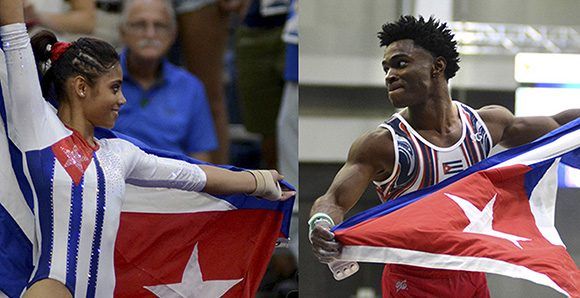Kilgore Trout
Banned
i'm not into white women
so that cant be about me !!!!
Latinas are white
i'm not into white women
so that cant be about me !!!!
What the hell does saying "all latinos" aren't black or of significant African ancestry have to do with "negative" views? I never said anything "negative" about any one here. I just said yourwas trying to lump anyone from a country that has some African ancestry in them with all blacks because you're clearly obsessed with the women.
For example:

Leidy Solis from Columbia=clearly black


These people regardless of what latin american country they from are clearly black.
What you're doing is going "gee there was slaves there so therefore all those folks are clearly black because _____ has 20% African ancestry!!!"
In your mind these folks



Are all just as black as the ones above.
The fault in your logic is you assume the ancestry is equal among everyone.
Someone like this for example is Haitian:

doesn't mean all haitians may have the same ancestry as her. The region one is from can have completely different ancestry.
There's polish Haitians that if they took DNA test they'd be have less African ancestry than other haitians but that wouldn't make them representative of the entire island.



Not all people from Ayiti(the entire island) is one people from the same place. I know a few Puerto Ricans, Dominicans and cubans and they're all very different.
they don't want to claim black, they are black.
This whole attempt to adapt exclusive ethno nationalism for black americans and define other peoples blackness is retarded. There is no such thing as "pure" black american and "black american culture" is heavily rooted in cultures and traditions from outside the US.
Breh u slow ? What was negative about saying all latino people aren't of the same ancestry? Do YOU know every single person of the latino "group"?i never said that
i called yall bama’s & said i dont understand how yall can have an negative opinion about a group that you don't even know
and the latter wasn’t really for you
it was for the other poster
Mexicans
Most have no black in them. They spanish and indian.
Ricans and cubans . Most are white or metizmo.
On the island only 15 percent of ricans identify as black
Domincan and Brazilian have a larger black portion. Most are either black or mulatto mix
This is a non issue. Some of yall stupid mufukkas dont even believe the earth is round, but wanna be experts on what defines African identity in other peoples cultures. Thats like my Cuban ass saying well Trace Ellis Ross and Lenny Kravitz cant claim ADOS cuz they not fully black.
Even if I was right thats not my conversation to have. Being a part of afrocentric consciousness doesnt start and end with the United States. And fat joe aint tell a single lie but watch the internet agents and hotep militant fake egyptian Hebrew brigade come in and act outraged cuz it doesnt fit their pseudo nationalist xenophobic anti black immigrant agenda, cuz they would rather be white daddies top lap dog then to form a new pack with their brothers, sisters, and distant cousins over seas
By Darryl Fears
Washington Post Staff Writer
At her small apartment near the National Cathedral in Northwest Washington, Maria Martins quietly watched as an African American friend
studied a picture of her mother. "Oh," the friend said, surprise in her voice. "Your mother is white."
She turned to Martins. "But you are black."
That came as news to Martins, a Brazilian who, for 30 years before immigrating to the United States, looked in the mirror and saw a morena
-- a woman with caramel-colored skin that is nearly equated with whiteness in Brazil and some other Latin American countries. "I didn't realize
I was black until I came here," she said.
That realization has come to hundreds of thousands of dark-complexioned immigrants to the United States from Brazil, Colombia, Panama
and other Latin nations with sizable populations of African descent. Although most do not identify themselves as black, they are seen that way
as soon as they set foot in North America.
Race matters in Latin America, but it matters differently.
This black presence is a legacy of slavery, just as it is in the United States. But the experience of race in the United States and in these Latin countries is separated by
how slaves and their descendants were treated after slavery was abolished.
In the United States, custom drew a hard line between black and white, and Jim Crow rules kept the races separate. The color line hardened to the point that it was
sanctioned in 1896 by the Supreme Court in its decision in Plessy v. Ferguson, which held that Homer Plessy, a white-complexioned Louisiana shoemaker, could
not ride in the white section of a train because a single ancestor of his was black.
Thus Americans with any discernible African ancestry -- whether they identified themselves as black or not -- were thrust into one category. One consequence is
that dark-complexioned and light-complexioned black people combined to campaign for equal rights, leading to the civil rights movement of the 1960s.
By contrast, the Latin countries with a sizable black presence had more various, and more fluid, experiences of race after slavery.
African slavery is as much a part of Brazil's history as it is of the United States's, said Sheila Walker, a visiting professor of anthropology at Spelman College in
Atlanta and editor of the book "African Roots/American Cultures." Citing the census in Brazil, she said that nation has more people of African descent than any other
in the world besides Nigeria, Africa's most populous country.
Jose Neinstein, a native white Brazilian and executive director of the Brazilian-American Cultural Institute in Washington, boiled down to the simplest terms how his
people are viewed. "In this country," he said, "if you are not quite white, then you are black." But in Brazil, he said, "If you are not quite black, then you are white."
Someone with Sidney Poitier's deep chocolate complexion would be considered white if his hair were straight and he made a living in a profession. That might not
seem so odd, Brazilians say, when you consider that the fair-complexioned actresses Rashida Jones of the television show "Boston Public" and Lena Horne are
identified as black in the United States.
Neinstein remembered talking with a man of Poitier's complexion during a visit to Brazil. "We were discussing ethnicity," Neinstein said, "and I asked him, 'What do
you think about this from your perspective as a black man?' He turned his head to me and said, 'I'm not black,' " Neinstein recalled. " . . . It simply paralyzed me. I
couldn't ask another question."
Those perceptions come to the United States with the light- and dark-complexioned Latinos who carry them. But here, they collide with two contradictory forces:
North American prejudice and African American pride.
'I've Learned to Be Proud'
Vilson DaSilva, a native of Brazil, is a moreno. Like his wife, Maria Martins, he was born to a black father and a white mother. But their views on race seem to
differ.
During an interview when Martins said she had no idea how they had identified themselves on the 2000 Census form, DaSilva rolled his eyes. "I said we were
black," he said.
He is one of a growing number of Latin immigrants of African descent who identify themselves as Afro-Latino, along the same color spectrum as African Americans.
"I've learned to be proud of my color," he said. For that, he thanked African American friends who stand up for equal rights.
DaSilva agreed that nuances separate African Americans and Afro-Latinos, but he also believes that seeing Latin America through African American eyes gave him a
better perspective. Unfortunately, he said, it also made him angrier and more stressed.
When DaSilva returned to Brazil for a visit, he asked questions he had never asked, and got answers that shocked him.
His mother told him why her father didn't speak to her for 18 years: "It was because she married a black man," he said. One day, DaSilva's own father pulled him
aside to provide his son some advice. " 'You can play around with whoever you want,' " DaSilva recalled his father saying, " 'but marry your own kind.' " So DaSilva
married Martins, the morena of his dreams.
She is dreaming of a world with fewer racial barriers, a world she believes she left in Brazil to be with her husband in Washington.
Martins said her perspective on race was slowly conforming to the American view, but it saddened her. She doesn't understand why she can't call a pretty black girl
a negrita, the way Latin Americans always say it, with affection. She doesn't understand why she has to say she's black, seeming to deny the existence of her
mother.
"Sometimes I say she is black on the outside and white on the inside," DaSilva said of his wife, who threw her head back and laughed.





I forgot Sa Neter is Dominican
 I don't believe these israelites are seriously believing the nonsense they spew.
I don't believe these israelites are seriously believing the nonsense they spew.U are completely lacking in knowledge of this. Dominican social status? Wtf are you talking about?
The Stigma of Blackness: Anti-Haitianism in the Dominican Republic | Socialism and Democracy
"nah man it's just politics and culture, not race."
Of course I gotta be super clear, not all Dominicans think like this but the fact that there are some clearly black Dominicans claiming they're indio and not black is testament to how anti-black their dislike of Haitians is.

Breh u slow ? What was negative about saying all latino people aren't of the same ancestry? Do YOU know every single person of the latino "group"?
This isn't really news for those of us on the East Coast/Northeast side of the country, we already knew this unlike y'all down south/southwest regional posters who live in a "black & white" world.

Most people who are not Black American and want to claim Black only want to claim it because they want to participate in Black American Culture.


Angela commented, “Some people would say Dominican people are black.” And Dascha agrees. She said,
“I consider myself an afro-Latina. I think we’re very black. I consider myself to be a black woman. I think a lot of Dominicans should from what I see, that’s what we are.”